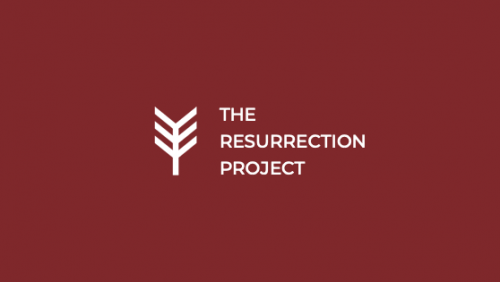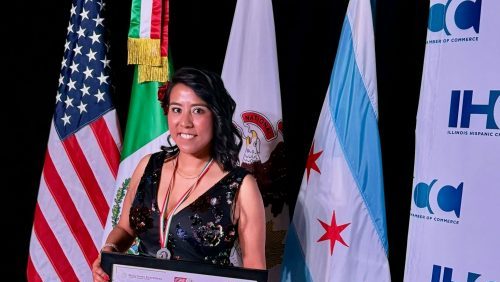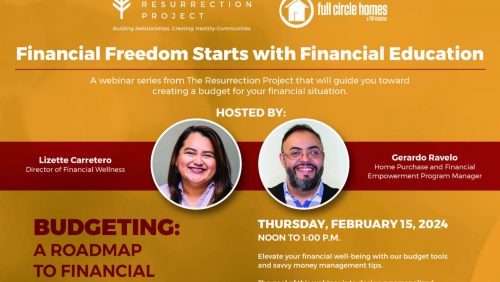Find Your New Home: Apartments Available for Lease. Click Here!
A day in the life of an organizer
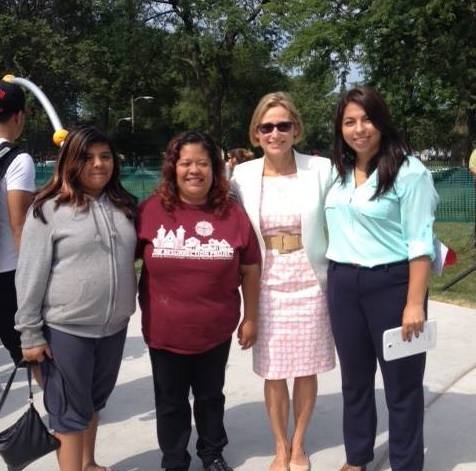
by Isabelle Barany
Here is something for you in order to understand a day in the life of an organizer at The Resurrection Project (TRP): there’s no such thing as a regular day. TRP’s staff organizers, fellows, and community leaders all epitomize the diversity of daily tasks necessary to build healthy communities.
Your day might begin with planning or leading a training for community members. The type of training depends on the organizer’s focus. For years, TRP’s organizers have held leadership development trainings in its partner parishes and schools. The two-part program first develops the participants’ confidence and communication skills, then teaches strategies to build community power. TRP also periodically leads civic trainings on the United States’ government, allowing leaders a better understanding of the democratic processes they use to create change.
Mayra López, one of TRP’s Community Organizers, manages TRP’s Parent Mentor program at five schools, along with TRP’s organizing initiatives in the Back of the Yards neighborhood. As the leader of the parent mentors, López is responsible for leading and facilitating a workshop per week for an entire school year. The program primarily works to engage parents and provide them with opportunities to become more active participants in their children’s school and neighborhood.
López facilitates presentations and brings in TRP staff and other experts to discuss leadership development and the Chicago Public Schools (CPS) system. The mentors also learned about financial wellness, physical health, and the college process. Organizers cultivate community leaders’ strengths by predicting and providing the knowledge leaders will need to be successful. This requires organizers to have one-on-ones with a community member who is considering becoming more involved. For Eréndira Rendón, TRP’s Head Organizer, these first meetings “establish working relationships” with others through “understanding their passion and self-interest.” Rendón also conducts one-on-ones with priests, principals, active teachers and church participants, non-profit members, and elected officials. The goal is to gain a better understanding of the needs and resources within the communities where TRP works. Equally as important, she builds partnerships. “You can’t work alone,” she says.
For Eréndira Rendón, TRP’s Head Organizer, these first meetings “establish working relationships” with others through “understanding their passion and self-interest.” Rendón also conducts one-on-ones with priests, principals, active teachers and church participants, non-profit members, and elected officials. The goal is to gain a better understanding of the needs and resources within the communities where TRP works. Equally as important, she builds partnerships. “You can’t work alone,” she says.
A bit later, your day might include canvassing, which refers to all face-to-face contact with community members. Typically, canvassers take their message to the streets, and go to public areas to talk to community members. “After a successful canvass of an area,” Rendón says, “people leave with a sense that somebody is doing something to serve them.”
Tabetha Martinez, a TRP summer fellow working with the Illinois Coalition for Immigrant and Refugee Rights (ICIRR), helped to execute TRP’s voter registration campaign. Martinez canvassed public areas including bus stops, train stations, and parks to ask residents if they were registered. Everyone carried voter registration forms, and un-registered voters filled out their information in person with the assistance of the canvassers. Speaking in both English and Spanish, the canvassers also briefly informed constituents on key election issues
Head organizers like Rendón also attend coalition meetings. TRP is a member of ICIRR, which has been a powerful force for immigration reform throughout the state and nationally. At ICIRR’s quarterly meetings, leaders from organizations in the coalition decide which campaigns to pursue, and how each organization will contribute.
For example, TRP played a huge role in the campaign to pass legislation for Temporary Visitor Driver Licenses (TVDLs), which allows all drivers, regardless of status, to hold a license. This has made Illinois roads safer since it has reduced the number of uninsured drivers. Rendón also attends organizing meetings, where she helps to decide and plan a campaign’s actions.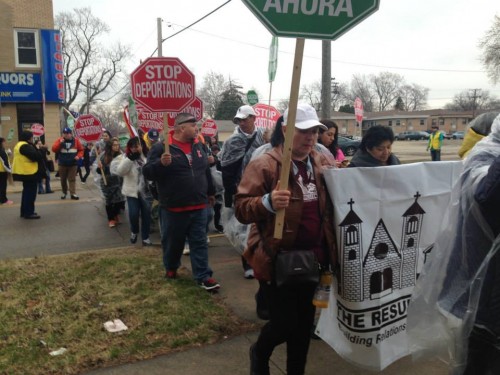 This might take the form of attending a demonstration, gathering for a vigil, making phone calls to legislators, creating a council, or a marching outside of detention centers, or lawmakers’ offices. In the summer of 2014, TRP and its leaders participated in numerous actions, including a vigil outside of President Obama’s house for the individuals in deportation proceedings and their families.
This might take the form of attending a demonstration, gathering for a vigil, making phone calls to legislators, creating a council, or a marching outside of detention centers, or lawmakers’ offices. In the summer of 2014, TRP and its leaders participated in numerous actions, including a vigil outside of President Obama’s house for the individuals in deportation proceedings and their families.
All circled around the block while holding candles and singing softly. Among TRP leaders attending the vigil was Maria Ochoa, a Parent Mentor at Daley Elementary School. As a member of a mixed immigration status family, Ochoa is directly impacted by the lack of reform, and has participated in actions outside of detention centers, Boehner’s house in Ohio, and the White House itself. In her determination to keep insisting and asking for reform, Ochoa epitomizes the spirit of TRP’s organizing as a whole. “If we do nothing,” she says, “we won’t accomplish anything.”
Ochoa, who is a strong voice for her community and was even interviewed by Univision at the vigil, did not do any advocacy before TRP. This gives Rendón the most pride. She believes organizing can deliver life-transforming moments, as those involved become aware of their own power. It is through these moments—an interview, a speech, a registration—that organizing creates changes in the world.
Learn more about TRP’s Community Organizing Department and get involved!
